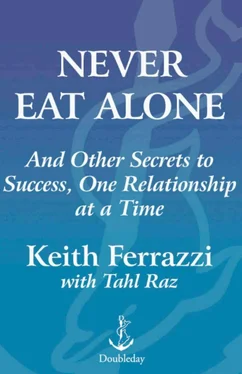Keith Ferrazzi - Never Eat Alone
Здесь есть возможность читать онлайн «Keith Ferrazzi - Never Eat Alone» весь текст электронной книги совершенно бесплатно (целиком полную версию без сокращений). В некоторых случаях можно слушать аудио, скачать через торрент в формате fb2 и присутствует краткое содержание. Год выпуска: 2005, ISBN: 2005, Издательство: C U R R E N C Y • D O U B L E D A Y, Жанр: marketing, на английском языке. Описание произведения, (предисловие) а так же отзывы посетителей доступны на портале библиотеки ЛибКат.
- Название:Never Eat Alone
- Автор:
- Издательство:C U R R E N C Y • D O U B L E D A Y
- Жанр:
- Год:2005
- ISBN:0-385-51529-4
- Рейтинг книги:4 / 5. Голосов: 1
-
Избранное:Добавить в избранное
- Отзывы:
-
Ваша оценка:
- 80
- 1
- 2
- 3
- 4
- 5
Never Eat Alone: краткое содержание, описание и аннотация
Предлагаем к чтению аннотацию, описание, краткое содержание или предисловие (зависит от того, что написал сам автор книги «Never Eat Alone»). Если вы не нашли необходимую информацию о книге — напишите в комментариях, мы постараемся отыскать её.
Never Eat Alone — читать онлайн бесплатно полную книгу (весь текст) целиком
Ниже представлен текст книги, разбитый по страницам. Система сохранения места последней прочитанной страницы, позволяет с удобством читать онлайн бесплатно книгу «Never Eat Alone», без необходимости каждый раз заново искать на чём Вы остановились. Поставьте закладку, и сможете в любой момент перейти на страницу, на которой закончили чтение.
Интервал:
Закладка:
I asked my friend to join me a half hour in advance at the hotel I was staying at for a little one-on-one time. And if the details of the project I was discussing with the COO were private, I might schedule a little one-on-one time with him after dinner.
The point is I'm constantly looking to include others in whatever I'm doing. It's good for them, good for me, and good for everyone to broaden their circle of friends. Sometimes I'll take potential employees for a workout and conduct the interview over a run. As a makeshift staff meeting, I'll occasionally ask a few employees to share a car ride with me to the airport. I figure out ways to as much as triple my active working day through such multitasking. And, in the process, I'm connecting people from different parts of my "community."
The more new connections you establish, the more opportunities you'll have to make even more new connections. As Robert Metcalfe, the inventor of Ethernet, says: The value of a network grows proportional to the square of the number of its users. In the case of the Internet, every new computer, every new server, and every new user added expands the possibilities for everyone else who's already there. The same principle holds true in growing your web of relationships. The bigger it gets, the more attractive it becomes, and the faster it grows. That's why I say that a network is like a muscle—the more you work it, the bigger it gets.
Such cloning is also a good way to ensure that a meeting or gettogether is worthwhile. If I'm meeting someone whom I don't know that well, I might invite someone I do know just to make sure the meeting does not become a waste of time. Mentees, for instance, get a special kick out of sitting in on such meetings— and it can be a great learning opportunity. It gets them face time with me, they get a chance to see business in action, and I make sure our reason for the meeting gets accomplished. In most cases, they end up contributing something to the meeting as well. Don't underestimate young people's ability to find creative new insight.
When you try this sort of thing, pay special attention to the chemistry between people. Do you have a sense of who will get on well with each other? It doesn't mean that everyone has to have the same background and sensibility. In fact, a nice mix of different professions and personalities can be the perfect recipe for a terrific gathering. Trust your instincts. One litmus test I often use is to ask myself if I think I'll have fun. If the answer is yes, that is usually a good sign that the dynamic will work.
Have you taken a colleague to lunch lately? Why not invite him or her out today—and include a few other people from different parts of your company or business network.
Soon, you'll have an ever-expanding web of friends and contacts.
Learn from Your Setbacks
For all his legendary success and greatness as a president, Abraham Lincoln lost all the time. Lincoln experienced numerous business, political, and personal setbacks over his life. But he never let any of his failures discourage him from pursuing his goals.
Lincoln failed in business. He failed as a farmer. He lost running for state legislature. He had a nervous breakdown. He was rejected for a job as a land officer. W h e n he was finally elected to the legislature, he lost the vote to be speaker. He ran for Congress and lost. He ran for and lost a U.S. Senate seat. He ran for vice president and lost. He ran for the Senate and lost a g a i n . A n d , when he was finally elected president, the nation he was elected to lead broke apart. But by this time, all the activities, experiences, and people he came to know in the process helped him set a direction for that country that will stand as one of America's great legacies.
My point is, behind any successful person stands a long string of failures. But toughness and tenacity like Lincoln's can overcome these setbacks. Lincoln knew the only w a y to gain ground, to move f o r w a r d , to turn his goals into reality, was to learn from his setbacks, to stay engaged, and press on!
12. Share Your Passions
I have a confession to make. I've never been to a so-called "networking event" in my life.
If properly organized, these get-togethers in theory could work. Most, however, are for the desperate and uninformed. The average attendees are often unemployed and too quick to pass on their resumes to anyone with a free hand—usually the hand of someone else who is unemployed looking to pass on his resume. Imagine a congregation of people with nothing in common except joblessness. That's not exactly a recipe for facilitating close bonds.
When it comes to meeting people, it's not only whom you get to know but also how and where you get to know them.
For example, take the first-class section on an airplane. Flying first class is not something most people can afford, but there's an interesting camaraderie among those front seats that you won't find back in coach. To begin with, there are always a number of movers and shakers up front, in close quarters, for hours at a time. Because they've slapped down an absurd premium for the luxury of getting off the plane a few seconds earlier than the rest of the passengers, fellow first-classers assume you, too, are important, and they often seek to quench their curiosity about who you are and why you're as dumb as they are to pay such an inflated price. I can't tell you how many valuable clients and contacts I've met during a conversation struck up during an in-flight meal. (By the way, this is the only acceptable time to bother your seat mate.)
At a so-called "networking event," the dynamics are just the opposite. People assume you're in the same boat they are—desperate. Credibility is hard to gain. If you're jobless, doesn't it make more sense to hang with the job-givers than fellow job-seekers?
There are better ways, and better places, to spend your time. Shared interests are the basic building blocks of any relation-
ship. Race, religion, gender, sexual orientation, ethnicity, or busi-
ness, professional, and personal interests are relational glue. It makes sense, then, that events and activities where you'll thrive are those built around interests you're most passionate about.
Friendship is created out of the quality of time spent between two people, not the quantity. There is a misconception that to build a bond, two people need to spend a great deal of time together. This is not the case. Outside your family and work, you probably can count the people you see a great deal of in the course of a month on two hands. Yet, surely, you have more than ten friends. It is what you do together that matters, not how often you meet. That's why you have to pay special attention to where you're most comfortable and what activities you most enjoy.
Usually it's the events and activities you excel at that you're most passionate about. So it makes sense to make these the focus of your efforts. For me, my love of food and exercise has led to the most amazing get-togethers. For others, it maybe stamps, baseball cards, politics, or skydiving that brings you together.
The power of shared passion in bringing people together can be seen today in the rising trend of blogs, or Web logs. Blogs are online journals, usually dedicated to an individual's interests, containing commentary and links to relevant news and information.
Popular blogs attract like-minded legions to their sites. The blogosphere (the community of active bloggers writing on topics that range from spirituality to sports) has grown from a dozen or so Web logs in 1999 to an estimated five million today.
When they write the history of the 2004 presidential campaign, an entire chapter could be dedicated to blogs. No other innovation in the last twenty years has influenced electoral politics quite like these impassioned online communities. They've galvanized an unprecedented number of voters into action, raised millions, and given people an outlet to participate in the political process. It's amazing to think that one person, writing about what or whom they love, could have so much influence or create a community of people so quickly.
Читать дальшеИнтервал:
Закладка:
Похожие книги на «Never Eat Alone»
Представляем Вашему вниманию похожие книги на «Never Eat Alone» списком для выбора. Мы отобрали схожую по названию и смыслу литературу в надежде предоставить читателям больше вариантов отыскать новые, интересные, ещё непрочитанные произведения.
Обсуждение, отзывы о книге «Never Eat Alone» и просто собственные мнения читателей. Оставьте ваши комментарии, напишите, что Вы думаете о произведении, его смысле или главных героях. Укажите что конкретно понравилось, а что нет, и почему Вы так считаете.












